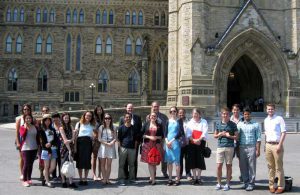
By Jim Hynes
Nineteen students from six universities around the globe have been at McGill for the past two weeks taking RELG 550, an intensive course on human rights and religious minorities hosted in collaboration with the Tony Blair Faith Foundation (TBFF). The Foundation aims to promote respect and understanding between the major religions, to make the case for faith as a force for good and to show this in action by encouraging inter-faith initiatives to tackle global poverty and conflict. Its work with universities focuses on research and teaching that critically analyzes the role of the world’s religions within the dynamics of globalization.
“We are really pleased to host such talented students from the partner universities around the world,” said Professor Ellen Aitken, Dean of McGill’s Faculty of Religious Studies. “It has been a rich and intense two-week course, especially as the students have discussed the difficult issues around human rights and religious minorities with great commitment and analytical depth. I am very grateful to Professor Dan Cere for his expertise in designing the course and leadership in coordinating the various academic components. We have also been assisted by an excellent team of PhD students from Religious Studies and Islamic Studies.”
The course participants are students involved with the Faith and Globalisation Initiative (FGI), a worldwide network of leading research universities that seeks to understand attitudes towards religious faith in a globalized world through research. In December 2009, McGill became the first Canadian university to partner with the TBFF on the Initiative. Today, the FGI network is made up of ten universities from around the world: McGill, Yale, the National University of Singapore, Durham University in England, Tecnológico de Monterrey, the University of Western Australia, the University of Hong Kong, the University of Sierra Leone (Fourah Bay College), the American University in Kosovo (Pristina University), and Peking University.
“Working on any topic to do with religion and globalization requires the perspectives of scholars and students from other parts of the world,” Aitken said. “An opportunity like this course enables us to create an academic space where a plurality of ‘global’ voices can contribute, where students can learn from one another—both in class and outside—and where ideas are enfleshed and explored in truly international community. Its importance lies not only in the topics examined, but also in the way the course, as well as the religion and globalization initiative as a whole, equips students to be leaders in their own contexts.”
Students taking this summer’s course came from McGill (4), the University of Western Australia (5), the National University of Singapore (3), Peking University in Beijing (3), Mexico’s Monterrey Tech (3), and Yale (1).
“This course is a rare opportunity to be able to interact with students from universities across the world, working with one another’s different strengths and perspectives to innovatively examine contemporary issues of religion and globalization as they affect human rights,” said Margaret Eder, a U3 World Religions and Political Science student at McGill. “ I wanted to be a part of it not only to further my area of study – the intersection of World Religions and Political Science, but also to gain increased global perspective on religious human rights discourse that I believe only opportunities like this can provide.”

The course consisted of a series of lectures and panel discussions exploring contemporary issues to the rights of religious minorities. Topics covered included the historical evolution of the international conversation on religious minorities and human rights, the diverse contributions of the major world religions and their approaches to religious minorities, and contemporary legal, philosophical and theological debates on the relationship of religion, rights, and the law in democratic societies. Participants also took part in activities outside the classroom, including a meeting with officials from the Department of Foreign Affairs and International Trade in Ottawa and a tour of the Houses of Parliament, where they had a conversation with Liberal MP John MacKay.
“Taking part in this course is a wonderful opportunity to translate wider ideas surrounding religion and human rights into a different approach to indigenous Australia and tackling health and education in rural communities, an area in which I am very passionate about,” said Tessa Brown, who is pursuing a BA in Anthropology at the University of Western Australia.
“Most of the issues discussed in the course are new,” said Midhfa Naeem, a Master’s student at the National University of Singapore’s Lee Kuan Yew School of Public Policy. “And while that makes the course challenging, the informal setting, friendly environment, informed and insightful lectures are a huge help. The best part is the debates and interactions among the very diverse group of participants.”
While McGill will continue to develop various dimensions of the initiative in the world’s religions and globalization—teaching, research, publication, public outreach—both in the Faculty of Religious Studies and in partnership with many others across the university, Dean Aitken says, the summer course itself will probably move to one of the other universities in the network next year, in a different part of the world and with a different thematic focus.
For more information about the Tony Blair Faith Foundation’s Faith and Globalisation Initiative, visit www.fgi-tbff.org/. For information about the initiative at McGill, visit www.mcgill.ca/religionandglobalization.
Special thanks to Kate Leuschen Millar and Aatif Baskanderi for their assistance in the writing of this article.
